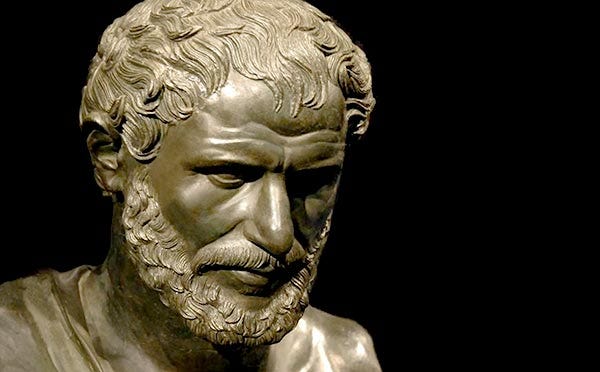It’s the spring of 2015. I’m at a dank sports bar having a beer with my fellow anarcho-capitalist friend Meghan. Amid sips she begins sharing with me her newest discovery in life:
Stoicism
I listen with rapt attention as she recounts some of the insights she’s captured. Intrigued, I decided to explore what Stoicism is all about and how it might have an impact on my own life.
The genesis of this ancient Greek school of philosophy is a fascinating one. According to historical lore, it began over three hundred years before the birth of Christ. As the story goes, a merchant ship loaded with purple dye was headed from Cyprus to Greece. As the ship approached the Athens post city of Piraeus, it ran into a storm causing it to shipwreck.
Among the survivors was a 22-year old young man by the name of Zeno. He decides to head to Athens and falls in love with the city. It became his home for the next fifty years.
One day he meandered into a bookstore and began taking in some of the works of the late philosopher Socrates. Impressed with his writings, he asked the bookstore owner whether there was anyone quite like Socrates that was still alive. Glancing out the window, the owner saw Diogenes ambling along across the street. “You’re in luck my friend,” said the bookstore merchant to Zeno, pointing out the Cynic known as Diogenes, “Follow that man!” Zeno complied.
Back in the day, Cynics believed that the purpose of life was to live in flow with nature. In Taoism, we call this Wu-Wei or Effortless Action. The aim? — reject all attachment to material possessions and outcomes. In other words, life becomes more meaningful when we rhythmically roll with nature versus grudgingly trying to force things to happen.
Zeno became a huge fan of Cynicism, totally absorbing the work of Diogenes and practicing asceticism. When he turned 33, he began teaching his own version of this philosophy at an Athens colonnade known as the Stoa Poikile or painted porch. His teaching, therefore, became known as Stoicism.
In a similar vein as the Cynics, Zeno believes that we should take a rational approach to nature. In this way, Stoics championed the importance of enjoying all of the wonderful things that come our way while at the same time relinquishing the nice things when they are taken from us. In a sense, this embodied having the best of both worlds.
What I am learning about Stoicism is how closely aligned it is with the philosophical underpinning of my spiritual beliefs around Taoism. In striking a harmony between humanity and nature — The Tao, or The Way, is where everything is in accord with nature.
Andreas Athanas in his book Mastering The Stoic Way of Life — Mastering The Stoic Way Of Life: Improve Your Mental Toughness, Self-Discipline, and Productivity with Ancient Stoic Wisdom captures the broader essence of this in asserting:
“Finally, we come to the aim of man’s role, to attain virtue through a philosophically introspective life. With this sort of order imposed on the world around him, Zeno built the basics of a philosophy that sought to place the natural world as a prime directive, as an original mover. It is from the ordering of the universe that everything else springs forth. Perhaps this notion speaks to why we have no agency in controlling the world. In the end, everything going on around us has a performative role in our lives as the schematic by which we subconsciously live.”





Be. In. The. Moment.